Rodney King: 30 Years After Brutal Beating, Activists Say LAPD 'Still Corrupt and Violent'
Thirty years after the savage assault on Rodney King, the Los Angeles police department is facing a reckoning over its failure to curb brutality, racial profiling and officer misconduct since the historic uprising.
For some in LA, Wednesday’s anniversary of the 1991 attack is a painful reminder of the ways the racist and deadly law enforcement practices of the 1990s remain alive today.
LAPD in recent years has faced scrutiny from a new wave of activists who have organized against police killings of civilians, discriminatory arrests and traffic stops, harassment and surveillance of Black and Latino residents, and militarized responses to protests. Arguing previous reforms have done little to curb the department’s brazenness, they are calling for sweeping change: take away power, and funding, from LAPD.
Rodney King in Los Angeles, 2012. Photograph: Matt Sayles/AP
“LAPD is still corrupt and violent and brutal,” said Melina Abdullah, co-founder of Black Lives Matter LA. “Since Rodney King, LAPD has just gotten slicker. Very little has changed, other than they’ve gotten better at PR.”
The calls to defund LAPD gained traction during last year’s uprisings after the killings of George Floyd and Breonna Taylor – and activists are launching a new campaign to build on that momentum. “We can reimagine public safety by divesting from police and freeing up those dollars to invest in the things that actually bring about safe communities,” said Abdullah.
‘The whole world watched’
On 3 March 1991, just after midnight, 25-year-old Rodney King was pulled over, and four white LAPD officers brutally kicked and beat him on the pavement. The officers struck King 56 times with their batons as he lay face down.
Videotape of the incident shot from a nearby apartment. Photograph: George Holliday
“It was like being raped, stripped of everything, being beaten near to death there on the concrete,” King recalled in an interview with the Guardian in 2012, a month before his death. “I just knew how it felt to be a slave.”
There were no smartphones at the time, but a witness filmed the beating from his balcony and gave the footage to a local news station. It was one of the first videos to capture this form of abuse that was so common.
Soon, television stations around the US were airing video of the assault, recalled Jody David Armour, a University of Southern California law professor and expert on police brutality.
The footage itself did not prompt mass protests. But in April 1992, a nearly all-white jury acquitted the policemen, and anger over racism and police violence in South LA boiled over in uprisings that left more than 60 people dead and destroyed or damaged more than a thousand buildings.
“People waited for the criminal justice system to make good on its promise to give equal justice. The riots exploded only when that promise of justice seemed so flagrantly flouted by the jury,” said Armour.
Flames roar from a Thrifty Drug store in the Crenshaw area of Los Angeles on 29 April 1992. Photograph: Mike Nelson/AFP/Getty Images
“The buildings were burning so bad that you could feel the heat from both sides of the street coming into the car as we were driving,” recalled Quintus Moore, a 62-year-old South LA resident who lived through the riots.
Moore was 33 when the riots erupted three miles from his home. The acquittal was as horrifying as the video, he said: “The whole world saw it.” He wasn’t surprised that people rose up: “That is the only way they hear us sometimes.”
Armour said the riots had been followed by some financial investments in South LA, but no meaningful LAPD reforms.
Instead, in the late 90s, the LAPD was caught in a vast corruption, abuse and drug dealing scandal, in which police framed civilians and falsified reports, leading to more than 100 wrongful convictions.
That case, known as the Rampart scandal, led to federal oversight, and a number of reform efforts were adopted in the following years, including implicit bias training, de-escalation efforts, community outreach work, audits, improved data collection, training on community policing, and increased diversity of the force.
Smoke rises from a shopping center burned by rioters in Los Angeles on 30 April 1992. Photograph: Paul Sakuma/AP
But two decades later, it is unclear whether the reforms have gone far enough – or are even working as intended. Recent data has repeatedly shown that LAPD officers stop and search Black and Latino residents at significantly higher rates than white residents. In the last two years, officers have been accused of falsely labeling civilians as gang members in databases, citing fabricated information. Last year, the LA Times found that the police department appeared to have repeatedly violated its own rules when it used force against protesters, in some cases causing significant injury. And in the last month, the LAPD has been twice forced to apologize – first after officers allegedly circulated an offensive meme mocking George Floyd, then after the chief admitted he gave hugely inaccurate data to the LA Times that falsely suggested a major decline in controversial traffic stops.
“There have been reforms on paper, but if you ask community members if anything has changed, they say nothing has, really,” said Andrés Dae Keun Kwon, a lawyer with the ACLU of Southern California. “It’s the same old disproportionate stops, targeting, harassment, brutalizing and killing.”
“We were hopeful that this kind of confirmation of our experiences would mean that there would be justice and meaningful change,” Abdullah, of BLM, said of the King footage. Instead, “we saw police double down on violence and brutality … telling the world, ‘Don’t believe your lying eyes.’ It reminded us that the truth wasn’t really important to a system that put targets on the backs of Black people.”
Demonstrators protest against the verdict in the Rodney King beating case in front of LAPD headquarters, on 29 April 1992. Photograph: Nick Ut/AP
Businesses burn on Pico Boulevard near Hayworth Avenue on 30 April 1992. Photograph: Lindsay Brice/Getty Images
‘The culture hasn’t changed’
Marina Vergara, who grew up in South LA in the 1980s, said she still feared police harassment when she returned to the neighborhood today: “The only thing that has changed is who is wearing the badge. The culture hasn’t changed.”
While the LAPD had become more racially diverse, she said, she felt “they still don’t have a regard for human life”. Last year, an LAPD officer fatally shot her brother, Daniel Hernandez, after he had been involved in a vehicle collision and was holding a box cutter. The police commission later ruled that the officer had violated its policies when she fired two final shots while Hernandez was on the ground.
Melina Abdullah speaks during a Black Lives Matter-Los Angeles news conference last month. Photograph: Keith Birmingham/AP
The officer, Toni McBride, is a social media influencer who has regularly posted videos of herself firing high-powered weapons at a gun range and has sold merchandise with messages such as “hold the line”. McBride’s father is one of the directors of the Los Angeles Police Protective League, one of the unions that aggressively fights reforms, donates to and lobbies elected officials, and defends officers who kill members of the public.
Vergara rallied in support of a new BLM campaign last week, pushing to have law enforcement unions removed from the Los Angeles County Federation of Labor, an umbrella group, with the goal of eventually dissolving the unions. “We have to end the influence they have over politicians,” she said. “Police officers feel like they are untouchable.”
The group plans to protest every Wednesday outside the league’s offices.
“Police associations have been the primary force that has really enabled this explosion of brutal and violent policing,” said Abdullah.
In addition to dismantling unions, a coalition of local groups is also continuing to push for substantial cuts to the LAPD budget and for the funds to be reinvested in services and programs that support public health and safety. The mayor agreed to some reductions last year, and activists are fighting now to hold him accountable for his promises.
“So many activists are calling for defunding the police because the changes that have occurred in cosmetics have not made real changes in how many Angelenos and marginalized communities are experiencing policing,” said Armour. The law professor used to advocate for implicit bias training, but has come to realize that the work has been ineffective: “If you want to minimize harm to marginalized communities … you have to minimize the contact between police and members of those communities.”
Advocates are hopeful that there might be some change under the newly elected LA district attorney, George Gascón, who was backed by progressive groups and pledged to hold police accountable and reopen cases of killings by law enforcement.
Lora King, Rodney King’s daughter, addresses supporters at at a Black Lives Matter protest in the Venice Beach area of Los Angeles last year. Photograph: Damian Dovarganes/AP
LAPD and the union did not respond to an inquiry. The police union president, Craig Lally, called BLM’s campaign “laughable” in a statement, saying it was “one of the most undemocratic, authoritarian ploys there are” and adding: “They have zero ability to disband our union ... will continue to fight for the rights of working-class Americans.”
In one of his first moves on police accountability, Gascón is hiring a special prosecutor to oversee police misconduct investigations. And the DA recently announced his selection for the role: Lawrence S Middleton, the former US prosecutor who won convictions against the policemen who beat Rodney King in a federal civil rights trial.
Quintus Moore, the South LA resident who lived through the riots, became more involved in advocacy in 2018, after LAPD police fatally shot his son, Grechario Mack, who was having a mental health crisis inside a South LA mall. The police commission ruled that the shooting violated policy, but the officers have not faced charges.
“The thing that’s changed since then is there are body cameras and cellphones, and everything is videotaped,” said Moore. “But police are fighting for even less accountability, to make it even harder for officers to be fired or disciplined. And cops know they can get away with murder.”
Sam Levin is a correspondent for Guardian US, based in Los Angeles. Click here for Sam's public key. Twitter @SamTLevin

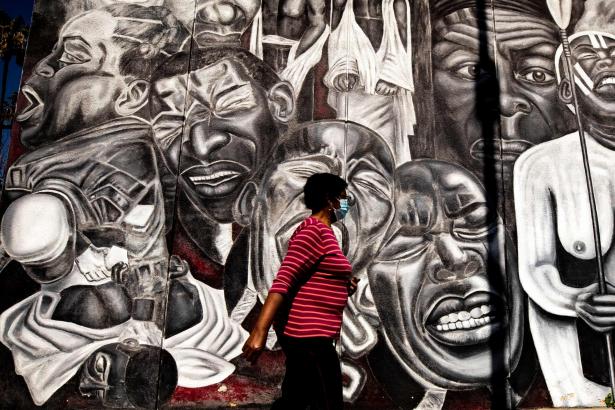
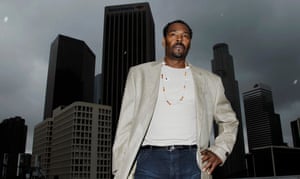
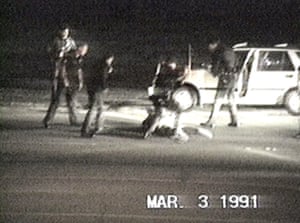
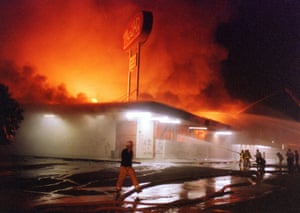
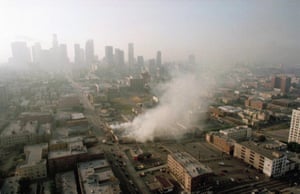
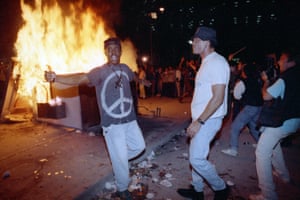

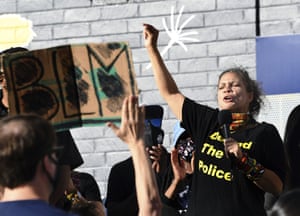
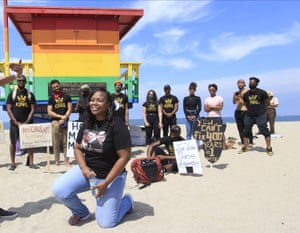
Spread the word